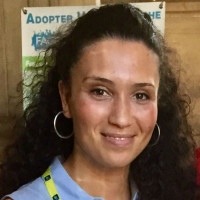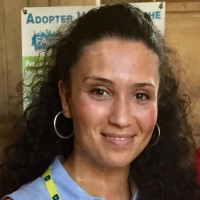
Criminalising BDS shows us what Israel fears most
The campaign initially began in Toronto many years ago and has since spread, with over 200 cities all around the world taking part this year.
Events are due to take place throughout late March and early April in order to shed light on the ongoing Israeli apartheid regime which has only intensified with the implementation of the new Nation State Law, which further enshrined Israel as an ethnically supremacist state.
This was further supported by Benjamin Netanyahu's proclamation that, "Israel is not a state of all its citizens. According to the basic nationality law we passed, Israel is the nation state of the Jewish people - and only it".
This year's IAW launched in al-Bireh, in the heart of the occupied West Bank, with the Sixth National BDS Conference, organised by the Palestinian BDS National Committee (BNC), and had over 900 attendees.
The conference initiated an international demand to 'Stop Arming Colonialism'. Students in over 30 campuses have already kicked off their IAW activities by opposing their institutions' complicity with the Israeli Occupation.
Students at Sheffield and Sheffield Hallam universities marked the week by marching against the ties between their institutions and complicit companies, including BAE Systems, Hewlett Packard, Caterpillar and Boeing.
Activist and student Shahd Abusalma told The New Arab, "Most Palestinian students, including myself, feel alienated to learn that our universities have links with arms companies profiting from ongoing Israeli crimes against our people.
"Israel has been bombing, killing, maiming, expelling, dispossessing and imprisoning the Palestinian people before the whole world, with impunity and without accountability."
 |
Opposition as well as university-level disruption of students' rights to protest and organise have become a familiar sight for the annual IAW |  |
At King's College London, where the institution has a partnership with the Israeli Institute of Technology in Haifa, also known as Technion, students started the week of action by interrupting a council meeting of the university's most powerful decision-making body. The activists presented an open letter demanding the university end these ties.
The Palestine Solidarity Campaign explained the significance of this relationship between the research centre and KCL:
"This institution collaborates with arms companies on technological endeavours which have seen the creation of remote-controlled bulldozers used to destroy Palestinian homes, as well as the electronic surveillance system used for Israel's illegal wall in the West Bank".
Twitter Post
|
Some of the activists who took part in the action said they were subsequently banned from their campuses due to an official visit from the Queen on Tuesday, who came to open a refurbished building on the Strand Campus.
The students were not able to attend classes, use their university services such as the libraries, go to work and in the case of one student - risked missing an exam.
Opposition as well as university-level disruption of students' rights to protest and organise have become a familiar sight for the annual IAW. A few years ago, the then Minister of State for Universities Jo Johnson MP had written to all universities in order to encourage Vice-Chancellors to oppose Israeli Apartheid Week.
There is a similar trend across the continent.
'The Intersection' (l'Intersection), an anti-racist and anti-imperialist collective at Paris university Sciences-Po, had planned an IAW event with Palestinian lawyer Rania Madi, which the institution later cancelled.
The collective accused the university of exercising double standards given that they have in the past allowed politically biased speakers from the far-right on campus including Alain Finkielkraut and Florian Philippot. Furthermore, they claimed that this decision - which contradicts the right to freedom of speech and the right to debate - demonstrates a lack of political neutrality on the part of the university.
In Berlin, Germany, three BDS activists, Ronnie Barkan, Stavit Sinai and Majed Abusalama faced faced trial early this week over their action at Humboldt University in 2017. The Humboldt 3 - as they're known - had disrupted an event with Israeli lawmaker Aliza Lavie.
Barkan gave a powerful speech to highlight the hypocrisy of their situation, and further criticise the Apartheid-like manner in which the state of Israel behaves through its systematic racism against Palestinians:
"I stand here today as the accuser, not the accused.
"If there is any wrong-doing on my part then it is of not doing enough to end the grave crimes that the state of Israel is responsible for. The accused today, your honour, are the criminal state of Israel and its accomplices who will be mentioned in this courtroom for aiding and abetting in Israeli crimes against humanity.
"I also stand here as a privileged Israeli-Jew who works to dismantle Apartheid.
 |
While repression continues to grow, especially at the hands of our states and by extension of our university managements, so too, does our resistance |  |
"A privileged Israeli-Jew" - just like the term "Apartheid" - is not a matter of personal opinion, but strictly a matter of legal definition. You see, your honour, I don't define myself as being Israeli or Jewish, but that is the way that the state of Israel defines me - that is my legal status under Israeli Apartheid."
These individual cases reflect a broader reality, that has seen Britain, France, and the US among others, increasingly moving to legally limit or outright ban the activities of the Palestine solidarity movement in general, and BDS in particular.
But while repression continues to grow, especially at the hands of our states and by extension of our university managements, so too, does our resistance.
Read more: Sheffield students protest university complicity in Israeli occupation
The growing efforts in the UK and across Europe, calling for universities to Disarm, Divest and Decolonise are proof of this.
The connections being made between each of these areas has highlighted to many, the resulting commonalities that include havoc wreaked on lands in the global south, the assault on brown and black bodies worldwide, and political censorship at home.
The solution, as always, is already in the problem. The more they repress, they smear, and they attempt to push into illegality the efforts of countless people around the world, the more they highlight the very tactics that they fear the most.
They more they attempt to roll back civil liberties, the more we need to roll out actions of disobedience.
The more they attempt to criminalise Palestine solidarity, the more the people of Palestine will be at the heart of any demand for justice, freedom, and liberation here, and around the world.
Malia Bouattia is an activist, a former president of the National Union of Students, and co-founder of the Students not Suspects/Educators not Informants Network.
Follow her on Twitter: @MaliaBouattia
Opinions expressed in this article remain those of the author and do not necessarily represent those of The New Arab, its editorial board or staff.
![Israeli apartheid week - [Pal Solidarity UK / Instagra] Israeli apartheid week - [Pal Solidarity UK / Instagra]](/sites/default/files/styles/large_16_9/public/media/images/0914944D-EC5D-4D4D-9BFA-1A3AD38ED925.jpg?h=d1cb525d&itok=HmbHLbeh)



